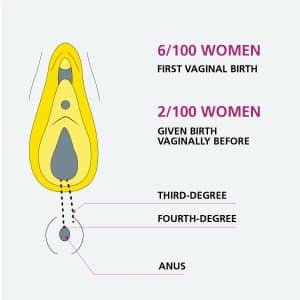
What is a perineal tear?
Many women experience tears during childbirth as the baby stretches the vagina and perineum.
Small, skin-deep tears are known as first-degree tears and usually heal naturally. Tears that are deeper and affect the muscles of the perineum are known as second-degree tears – these usually require stitches.
A third-degree tear is a tear that extends into the muscle that controls the anus, the anal sphincter. If the tear extends further into the lining of the anus or rectum it is known as a fourth-degree tear. These are called obstetric anal sphincter injuries (OASI).
An episiotomy is a cut made by a healthcare professional through the vaginal wall and perineum. This may be done if your baby needs to be born more quickly, or to make more space for your baby to be born. It is possible for an episiotomy to extend and become a deeper tear.
Advice following a perineal tear
If you have experienced an OASI, we highly recommend watching the following video for information on the following:
- What to expect following an OASI
- Aftercare advice
- Advice to reduce the risk of infection
- Opening your bowels following an OASI
- Pelvic floor advice and exercises
This video is available with subtitles in other languages at the bottom of this page.
You may also wish to take a look at our massage after stitches page.
Pelvic health physiotherapy
If you have experienced a third or fourth-degree tear, you will be contacted in the days following delivery by a member of the pelvic health physiotherapy team with some routine physiotherapy advice, or you may have received this directly on the wards.
You will receive further contact at 6 weeks post-natal from the Pelvic Health Physiotherapy team. This may be a face-to-face appointment or a telephone appointment.
You will be offered further Physiotherapy treatment if this is required.
If you have experienced a third or fourth-degree tear, you will also be invited to attend an OASI consultant appointment at around 3 months after birth. This referral will happen automatically after you are discharged from the hospital following birth.
More information
The MASIC Foundation supports women who have suffered severe injuries during childbirth.
Perineal tears and episiotomies in childbirth (RCOG) Back to pregnancy and after childbirthVideos with subtitles in other languages:
Post Natal Care Following Perineal Trauma – Urdu subtitles
Post Natal Care Following Perineal Trauma – Somali subtitles
Post Natal Care Following Perineal Trauma – Punjabi subtitles
Post Natal Care Following Perineal Trauma – Polish subtitles
Post Natal Care Following Perineal Trauma – Bengali subtitles